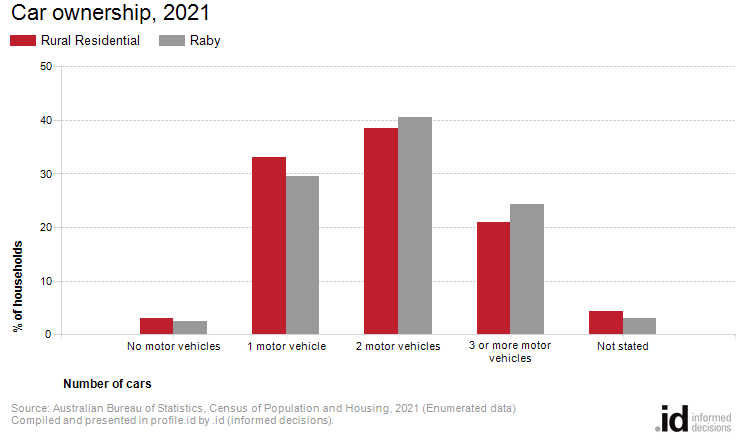Rural Residential
Number of cars per household
Analysis of car ownership in 2021, indicates 60% of households in Rural Residential had access to two or more motor vehicles, compared to 65% in Raby.
The ability of the population to access services and employment is strongly influenced by access to transport. The number of motor vehicles per household in Rural Residential quantifies access to private transport and will be influenced by Age Structure and Household Type, which determine the number of adults present; access to Public Transport; distance to shops, services, employment and education; and Household Income. Depending on these factors, car ownership can be seen as a measure of advantage or disadvantage, or a neutral socio-economic measure, which impacts on the environment and quality of life.
Derived from the Census question:
'How many registered motor vehicles owned or used by residents of this dwelling were garaged or parked at or near this dwelling on the night of 10 August 2021?'
Households
Source: Australian Bureau of Statistics, Census of Population and Housing (opens a new window) 2016 and 2021. Compiled and presented by .id (opens a new window)(informed decisions).
(Enumerated data)

Compiled and presented in profile.id by .id (informed decisions).

Compiled and presented in profile.id by .id (informed decisions).
Dominant groups
Analysis of the car ownership of the households in Rural Residential in 2021 compared to Raby shows that 92.7% of the households owned at least one car, while 3.0% did not, compared with 94.3% and 2.6% respectively in Raby.
Of those that owned at least one vehicle, there was a larger proportion who owned just one car; a smaller proportion who owned two cars; and a smaller proportion who owned three cars or more.
Overall, 33.1% of the households owned one car; 38.6% owned two cars; and 21.0% owned three cars or more, compared with 29.5%; 40.6% and 24.2% respectively for Raby.
Emerging groups
The largest changes in the household car ownership in Rural Residential between 2016 and 2021 were:
- 2 motor vehicles (+1,043 households)
- 1 motor vehicle (+915 households)
- 3 or more motor vehicles (+460 households)
- No motor vehicles (+93 households)
